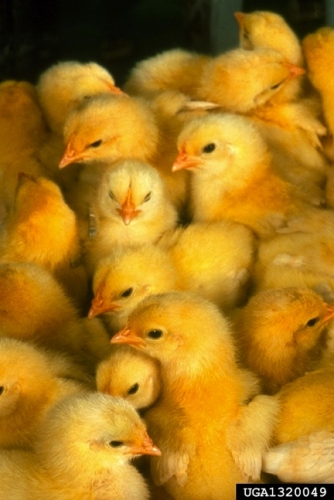Baby chicks and ducklings: protecting yourself from Salmonella
Regardless of where you purchase baby poultry, protect yourself and kids.
There are numerous joys associated with purchasing and raising chicks and ducklings. However, there are some basic rules that need to be followed to ensure that you do not become ill. As of June 8, 2011, the Centers for Disease Control and Prevention (CDC) reported an investigation conducted with public health and agriculture officials in a multistate, human outbreak of Salmonella serotype Altona infections. The 39 people from 15 states contracted the Salmonella infections from contact with chicks and ducklings originating from a hatchery.

Photo Credit: Keith Weller, USDA ARS, Bugwood.org
All baby poultry should be considered to carry Salmonella,a bacterium known to cause vomiting and diarrhea in humans. In some cases, this infection can prove deadly. This is true regardless of hatching them at home or purchasing them from a hatchery or other source. This does not require you to get rid of the baby poultry or try to clean them; BUT there is the chance that children or adults may become ill if some basic rules are not followed.
Remember the following guidelines when you are handling baby poultry:
- Wash your hands thoroughly with soap and water right after touching live poultry or anything in the area where they live and roam. Adults should supervise hand washing for young children.
- If soap and water are not readily available, use hand sanitizer until you are able to wash your hands with soap and water.
- Clean any equipment or materials associated with raising or caring for live poultry, such as cages or feed or water containers. Once clean, a solution of 1 part household bleach and 9 parts water should be used to disinfect those items.
- Do not let children younger than 5 years of age, the elderly, or people with weak immune systems handle or touch chicks, ducklings, or other live poultry.
- Do not let live poultry inside the house, in bathrooms, or especially in areas where food or drink is prepared, served, or stored, such as kitchens, or outdoor patios.
- Do not snuggle or kiss the birds, touch your mouth, or eat or drink around live poultry.



 Print
Print Email
Email




